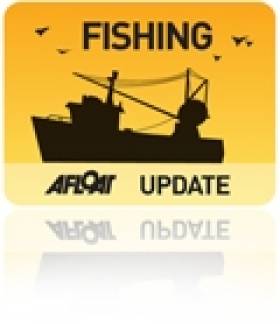Displaying items by tag: SeaFisheries Protection
Spanish Fisherman Fined for Illegal Fishing Activity
#fishing – Following a conviction at Cork Circuit Court, today, Friday 28th February, the Master of a Spanish fishing vessel was fined a total of €2,500 and forfeited €80,000, being the assessed value of his catch and a further €12,500 for the fishing gear onboard. Jesus Ramon Rea Rosales, Master of the fishing vessel Armaven Dos, pleaded guilty to the under-recording of monkfish in the vessel's EU logbook. The case arose during the course of a routine inspection of the Armaven Dos on the 5th August 2013, at Castletownbere, Co Cork, by Sea-Fisheries Protection Officers of the Sea-Fisheries Protection Authority (SFPA).
Sea-Fisheries Protection Officers inspected the vessel's onboard catch and when compared to its fishing logbook they discovered approximately 13 tonnes of monkfish retained onboard of which almost seven tonnes were unrecorded. In addition to the under-recording of monkfish, a substantial quantity of Megrim was also found to be unrecorded. The under-recording of catch is contrary to European Community Regulations as fishermen are required to keep an accurate record in the vessel's logbook of the fish they have onboard so that the catch limits and quotas imposed to protect these fish stocks are respected.
Susan Steele, Chair of the SFPA welcomed the outcome of the case and said: ""It is essential that all fishermen play their part in the rebuilding of damaged fish stocks such as monkfish if fishing is to be sustainable and profitable into the future. The requirement for fishermen to accurately record their catches and to keep within quota limits is a cornerstone of measures to rebuild damaged fish stocks and to share the burden of this stock recovery fairly among fishermen. The SFPA's inspection programme is intended to detect illegally caught fish and to protect the livelihoods of the many fishermen who respect the rules in place that safeguard the sustainable exploitation of valuable fish stocks. Stock recovery is good news for fishermen and ultimately leads to better fishing possibilities for the sector as well as improved market supply for consumers."





























































